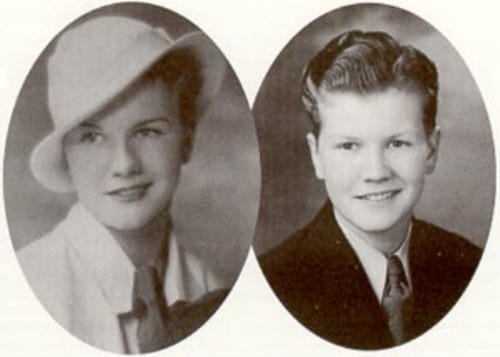They turned my gender into a dictionary word
“They” is the pronoun I waited my entire life for. I’ve been nonbinary for fifty years, which is a complete pain in the ass if you have no word for it. When I was a teenager in the 1980s, I used to tell my friends that I wasn’t a girl, and I wasn’t a boy. A few of those friends came out as gay, and I think they understood more than anyone else. But still, there were limits. How do you come out as something that isn’t a thing in your community?
The Matrix is everywhere
Sure, I knew there were a few identities like mine. When I was in college during the 1990s, I learned that some indigenous American cultures recognize two spirit people; I devoured the autobiography of Herculine Barbin and the biography of Billy Tipton. But these were not people from my culture or my time. My oldest friend transitioned when I was in grad school, and watching her journey made me realize that I wasn’t transgender either -- at least, not the way she is. I didn’t want to be a man. I wanted to be nothing. Or maybe everything.
It wasn’t a subtle feeling. It was exactly like the way Morpheus describes the Matrix to Neo.
Gender was everywhere and nowhere; it was at work, it was at school, and it was in government. It was, as Morpheus says, “A prison for your mind.” (This is why it made perfect sense to me when Lilly Wachowski said recently that The Matrix was an allegory for being trans.) Some days, it feels like I can’t go for more than a few minutes without somebody trying to gender me. A man will insist I go through a door ahead of him. A salesperson in a clothing store will steer me to the women’s section. The 2020 census forced me to pick “male” or “female.”
No one can be told what the Matrix is -- you have to see it for yourself. That used to be true for nonbinary gender too. Now, luckily, you can see it.
By the time time I started to hear the term “nonbinary” regularly, about five years ago, I had honestly given up on ever being recognized for what I am. I was sick of being angry and uncomfortable all the time. Grudgingly, I allowed people to mistake me for female. I used female pronouns, basically because I was tired and it seemed less exhausting than using a pronoun like “ey” or “ze” that required even more explanation. Plus, I think women are awesome, so I didn’t mind being associated with them.
But then the nonbinary pronoun “they” entered the dictionary and there was a simple way to identify myself. English speakers had been using the gender-neutral, singular pronoun “they” for centuries, and now it was official. Finally I could be legible to the world -- or at least my small part of the world. I started using they/them pronouns in August 2019, right around the time kids go back to school, as if I were starting a new semester of my life.
Inventing new ways to respect each other
There are as many ways to be nonbinary as there are to be male and female. Some of us like to dress up as different genders: a flouncy dress one day, and a sharp suit the next. Some of us take new names; some of us have gender confirmation surgeries. (Yes, there are nonbinary surgeries for people who don’t want stereotypically male or female bodies.) Some of us, like me, don’t change much outwardly at all. This is who I’ve always been. Now I have a name for it.
Having a name is so much better than existing as some kind of hypothetical creature, tucked away within old tropes like the sexless, bald White person dressed in gray, or the leering, glittery, David Bowie-in-Labyrinth type.
Now that culture is catching up to us, we are simply humans, looking for a way to be comfortable. Genderfluid icons like Billy Porter show us how to be fierce and fabulous. Or, like actor Theo Germaine, we can be dapper as hell. We are politicians, teachers, and data nerds. We even have an honorific, Mx, which I have convinced the New York Times to use in my bio on their website.
All of this feels very new, despite the fact that people have been nonbinary for an immensely long time -- probably for as long as we’ve had the concepts of male and female. And yet we keep inventing novel ways to talk about it. Sometimes those ways aren’t great (see David Bowie clip above), but others are a balm to my grizzled, black heart. They/them pronouns are something we’ve invented to show a new kind of respect to each other. Calling an enby “they” is like shaking someone’s hand and looking them square in the eye.
Pronouns are basically the please-and-thank-you of gender. We use them to doff our hats at each other, to acknowledge each other’s existence in a pleasant way. It’s no more difficult than saying “good day” on the street. Just as a friendly greeting from a stranger can make my morning brighter, hearing someone use the right pronoun can perk me up. It’s simply nice, in a wholesome Mr. Rogers kind of way.
Strangers have contacted me online to complain about how hard it is to use my preferred pronouns, or even to see them in a byline. These are people who would go out of their way to open the door for me if I were a woman, or would thank me profusely if I offered them a cookie. Arguably these bits of etiquette performance are more arduous than using the word “they.” Perhaps these complainers don’t understand that pronouns are a matter of politeness rather than politics.
Humans are always inventing new ways to hurt each other, but we invent new forms of respect too. I am glad to live in a time when my gender is visible and explainable without reference to postmodern gender theory. Even better, there’s a way for people to talk about my gender without using insults. They can simply be polite. And in return, I will pay them the respect they deserve.
Thank you kindly. I truly appreciate it. I’m much obliged, folks, much obliged. Hope you have a good evening and lovely weekend.
My next book is Four Lost Cities: A Secret History of the Urban Age. It's coming out in February 2021, and you can pre-order it now. You can find information and ordering links for my other books on my website, helpfully organized into science fiction and journalism. You can also follow me on Twitter or Instagram — or listen to Our Opinions Are Correct, the fortnightly podcast I co-host with Charlie Jane Anders. If someone forwarded this email to you, you can subscribe to it here.




